Episode 14
Hello and welcome to Episode 14 of Read Paradise Lost with me, Jane Davis, a podcast and Substack newsletter about my project to read all of Paradise Lost by John Milton, aloud, and with a sometimes word-by-word, sometimes line-by-line discussion. This is one-take recording with no editing, so forgive noise of seagulls, my coughing, or sound of men drilling next door. Rough and ready reading is what you get.
See Episode 1 for an introduction to the project. We’re in Book 2, as Satan’s council begins with a contribution from Moloc.
Satan Presiding at the Infernal Council” (Book II, line 1), John Martin, illustrations for Paradise Lost, 1827
I’ll first read this week’s portion, about 60 lines and then go more slowly through it:
He ceas'd, and next him Moloc, Scepter'd King
Stood up, the strongest and the fiercest Spirit
That fought in Heav'n; now fiercer by despair: [ 45 ]
His trust was with th' Eternal to be deem'd
Equal in strength, and rather then be less
Care'd not to be at all; with that care lost
Went all his fear: of God, or Hell, or worse
He reck'd not, and these words thereafter spake. [ 50 ]
My sentence is for open Warr: Of Wiles,
More unexpert, I boast not: them let those
Contrive who need, or when they need, not now.
For while they sit contriving, shall the rest,
Millions that stand in Arms, and longing wait [ 55 ]
The Signal to ascend, sit lingring here
Heav'ns fugitives, and for thir dwelling place
Accept this dark opprobrious Den of shame,
The Prison of his Tyranny who Reigns
By our delay? no, let us rather choose [ 60 ]
Arm'd with Hell flames and fury all at once
O're Heav'ns high Towrs to force resistless way,
Turning our Tortures into horrid Arms
Against the Torturer; when to meet the noise
Of his Almighty Engin he shall hear [ 65 ]
Infernal Thunder, and for Lightning see
Black fire and horror shot with equal rage
Among his Angels; and his Throne it self
Mixt with Tartarean Sulphur, and strange fire,
His own invented Torments. But perhaps [ 70 ]
The way seems difficult and steep to scale
With upright wing against a higher foe.
Let such bethink them, if the sleepy drench
Of that forgetful Lake benumm not still,
That in our proper motion we ascend [ 75 ]
Up to our native seat: descent and fall
To us is adverse. Who but felt of late
When the fierce Foe hung on our brok'n Rear
Insulting, and pursu'd us through the Deep,
With what compulsion and laborious flight [ 80 ]
We sunk thus low? Th' ascent is easie then;
Th' event is fear'd; should we again provoke
Our stronger, some worse way his wrath may find
To our destruction: if there be in Hell
Fear to be worse destroy'd: what can be worse [ 85 ]
Then to dwell here, driv'n out from bliss, condemn'd
In this abhorred deep to utter woe;
Where pain of unextinguishable fire
Must exercise us without hope of end
The Vassals of his anger, when the Scourge [ 90 ]
Inexorably, and the torturing hour
Calls us to Penance? More destroy'd then thus
We should be quite abolisht and expire.
What fear we then? what doubt we to incense
His utmost ire? which to the highth enrag'd, [ 95 ]
Will either quite consume us, and reduce
To nothing this essential, happier farr
Then miserable to have eternal being:
Or if our substance be indeed Divine,
And cannot cease to be, we are at worst [ 100 ]
On this side nothing; and by proof we feel
Our power sufficient to disturb his Heav'n,
And with perpetual inrodes to Allarme,
Though inaccessible, his fatal Throne:
Which if not Victory is yet Revenge. [ 105 ]
He ended frowning, and his look denounc'd
Desperate revenge, and Battel dangerous
To less then Gods.
I’m interested in Moloc’s self-destructive carelessness, and how that has been grown by his initial fierceness and, having failed in his ambition to equal God, subsequent despair;
He ceas'd, and next him Moloc, Scepter'd King
Stood up, the strongest and the fiercest Spirit
That fought in Heav'n; now fiercer by despair: [ 45 ]
His trust was with th' Eternal to be deem'd
Equal in strength, and rather then be less
Care'd not to be at all; with that care lost
Went all his fear: of God, or Hell, or worse
He reck'd not, and these words thereafter spake. [ 50 ]
Moloc, ‘the strongest’, having failed, now has nothing at all to lose. Let’s hear his argument:
My sentence is for open Warr: Of Wiles,
More unexpert, I boast not: them let those
Contrive who need, or when they need, not now.
For while they sit contriving, shall the rest,
Millions that stand in Arms, and longing wait [ 55 ]
The Signal to ascend, sit lingring here
Heav'ns fugitives, and for thir dwelling place
Accept this dark opprobrious Den of shame,
The Prison of his Tyranny who Reigns
By our delay?
Let’s do it, is the gist, we don’t want to ‘sit lingring here.’ He claims that God reigns ‘by our delay.’ It seems that losing the war in heaven and being hurl’d down to hell has meant nothing to this fighting soldier. He seems to have forgotten what happened and now believes God is only ruling because they delay the fightback:
no, let us rather choose [ 60 ]
Arm'd with Hell flames and fury all at once
O're Heav'ns high Towrs to force resistless way,
Turning our Tortures into horrid Arms
Against the Torturer; when to meet the noise
Of his Almighty Engin he shall hear [ 65 ]
Infernal Thunder, and for Lightning see
Black fire and horror shot with equal rage
Among his Angels; and his Throne it self
Mixt with Tartarean Sulphur, and strange fire,
His own invented Torments.
Moloc’s desire is to turn God’s instruments of torture against him (readers, please note: we are asked to wonder does a good God have instruments of torture? They were commonplace devices of punishment and control in Milton’s time. But are they part of God?).
As if imagining why nothing is happening, Moloc wonders
But perhaps [ 70 ]
The way seems difficult and steep to scale
With upright wing against a higher foe.
Let such bethink them, if the sleepy drench
Of that forgetful Lake benumm not still,
That in our proper motion we ascend [ 75 ]
Up to our native seat: descent and fall
To us is adverse.
Does the way back ‘seem difficult’, he asks? Moloc refers to God as ‘a higher foe’ but it feels as if that ‘higher’ is purely physical state. Which thought leads Moloc to reflect that ‘up’ is (or I’m thinking, was) natural to the fallen angels. Like Satan, Moloc struggles to see himself as a fallen creature, the template of heavenly being is so strong.
…in our proper motion we ascend [ 75 ]
Up to our native seat: descent and fall
To us is adverse
So, his cumbersome reasoning continues, we’re naturally inclined to go up, because look how hard it was for us to come down! What’s the matter, why aren’t we trying again? Are we afraid?
Who but felt of late
When the fierce Foe hung on our brok'n Rear
Insulting, and pursu'd us through the Deep,
With what compulsion and laborious flight [ 80 ]
We sunk thus low? Th' ascent is easie then;
Th' event is fear'd; should we again provoke
Our stronger, some worse way his wrath may find
To our destruction:
Again, it’s physical – it would be easy to rise, because that’s natural to us – almost as a cork must shoot up to the surface of water. What holds us back ? the fear that we will ‘provoke/our stronger’. Again, God is reduced to mere physical supremacy, and yet this must hurt for a creature like Moloc, used to being ‘the strongest’. And having called god ‘stronger’ is the reason he dips into nihilist realism as he faces the reality of their situation:
if there be in Hell
Fear to be worse destroy'd: what can be worse [ 85 ]
Then to dwell here, driv'n out from bliss, condemn'd
In this abhorred deep to utter woe;
Where pain of unextinguishable fire
Must exercise us without hope of end
The Vassals of his anger, when the Scourge [ 90 ]
Inexorably, and the torturing hour
Calls us to Penance? More destroy'd then thus
We should be quite abolisht and expire.
‘what can be worse/Then to dwell here, driv'n out from bliss,’ he asks in what seems genuine horror. He feels, as we have seen Satan feel, the reality of the dreadful situation they now inhabit, ‘without hope of end’ (remember from Book 1, hell being described as a place where ‘hope never comes/That comes to all’?)
They are, Moloc feels, only a tiny degree above being completely wiped out.
More destroy'd then thus
We should be quite abolisht and expire.
The word I have passed over here is ‘penance’. The torture calls them to penance, he believes, but that penance – the public acknowledgement of wrong, the giving in effected by torture, is not anywhere to be seen or felt. The nihilism that is the flipside to his determined physicality goes to its extreme:
More destroy'd then thus
We should be quite abolisht and expire.
What fear we then? what doubt we to incense
His utmost ire? which to the highth enrag'd, [ 95 ]
Will either quite consume us, and reduce
To nothing this essential, happier farr
Then miserable to have eternal being:
Or if our substance be indeed Divine,
And cannot cease to be, we are at worst [ 100 ]
On this side nothing; and by proof we feel
Our power sufficient to disturb his Heav'n,
And with perpetual inrodes to Allarme,
Though inaccessible, his fatal Throne:
Which if not Victory is yet Revenge. [ 105 ]
He ended frowning, and his look denounc'd
Desperate revenge, and Battel dangerous
To less then Gods.
Better to be ‘reduced to nothing’ than suffer ‘eternal being’ in Hell. Now we learn, (by the ‘or’) that Moloc does not know if the fallen angels are indeed eternal,
Or if our substance be indeed Divine,
And cannot cease to be,
But his argument is still ‘nothing lost’, because if they can’t win, simply the power ‘to disturb his Heav'n,’ ‘is yet Revenge’.
The big question for me is, for a being in hell (and I’m thinking of secular hells , thinking, for example, as an extreme example, of being guilty of some terrible act, being a murderer, living with that knowledge of guilt), is there anything at all that can attend to the pain and horror of what one has done, is there a way to end such a state? (I ask myself, does it have to be an extreme act? Aren’t ordinary everyday failures of pride enough?)
For the fallen angels of Milton’s poem, the answer seems to be, no, nothing. For Moloc the only answer is ‘fight more’.
But I am thinking about human beings. Of course, some of us do chose to fight more. But I am drawn back to the word penance, not an act perhaps for Milton – because of its catholic origins and his virulent anticatholicism – so in some sense for him a fallen idea. Penance is visible and outward, perhaps merely a show. The show isn’t what is needed.
Repentance is inner and changes the person who repents. But that experience – perhaps skirted near in Moloc’s sense of misery – is not one for him. He remains what he always was, strong and fierce and up for the fight.
More next week.





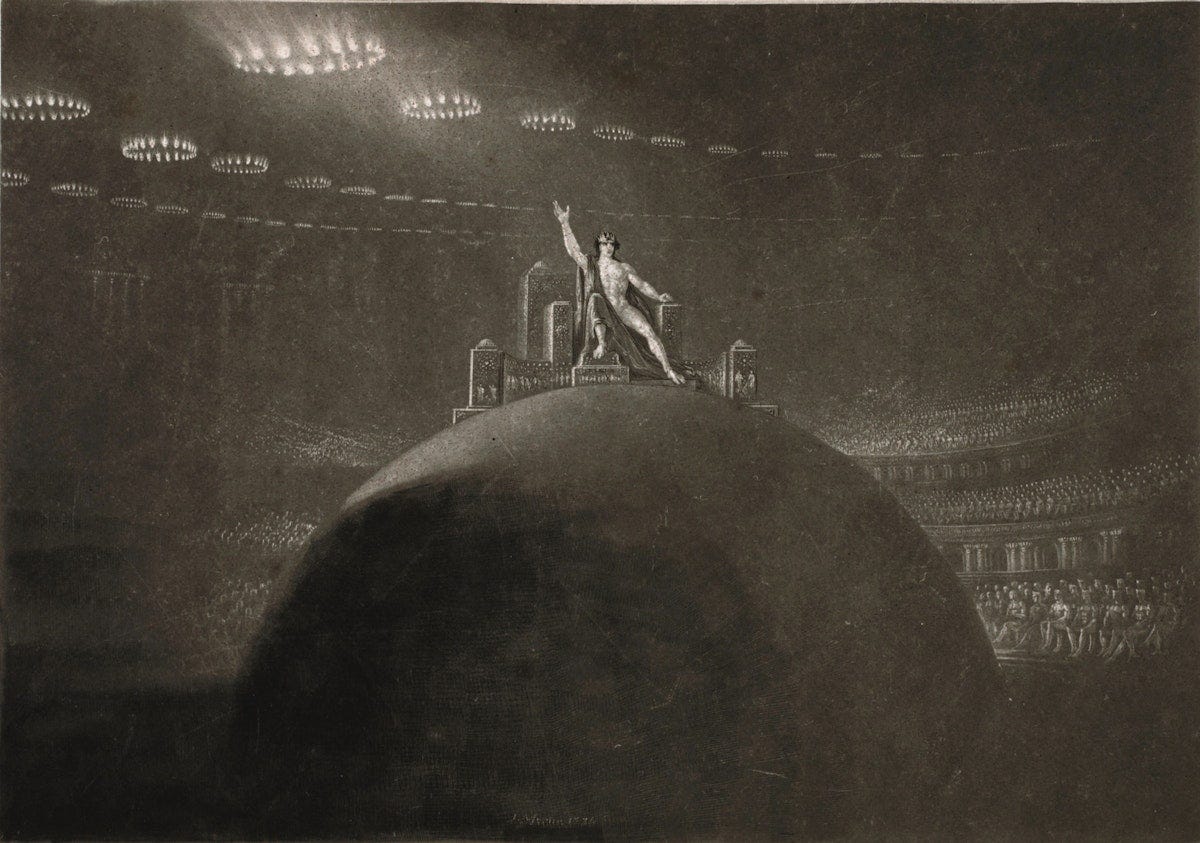

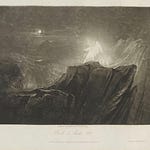
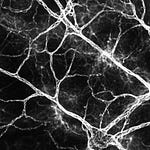

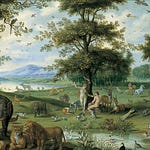
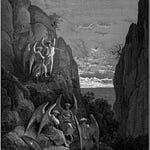
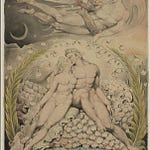
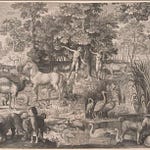
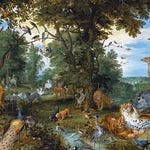
Share this post